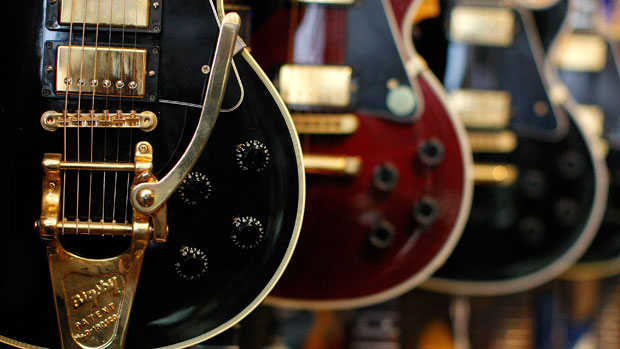Les Paul at 100: what made his guitar so popular?
The musician behind the iconic Gibson Les Paul guitar would have turned 100 today

A free daily email with the biggest news stories of the day – and the best features from TheWeek.com
You are now subscribed
Your newsletter sign-up was successful
Les Paul, the pioneering guitarist, songwriter and inventor, was born 100 years ago today. Though his records sold millions, he is perhaps best known for his own brand of electric guitar, the Gibson Les Paul. The guitar is used by some of the most famous names in the music world and continues to sell strongly today.
Who was Les Paul?
Lester William Polsfuss was born in Waukesha, Wisconsin, on 9 June 1915. His biggest hits – including the 1951 record How High the Moon – were recorded with his wife of the time, Mary Ford. Though Paul was initially known for his jazz style, after developing the Gibson Les Paul electric guitar, he made a name for himself in the rock and roll world and even won two Grammys as a nonagenarian before dying, aged 94, in 2009. "What he was doing on those hits couldn't have failed to influence any guitarist," Led Zepplin's Jimmy Page once said, while musician Jeff Beck said he had "copied more licks from Les Paul than I'd like to admit".
The Week
Escape your echo chamber. Get the facts behind the news, plus analysis from multiple perspectives.

Sign up for The Week's Free Newsletters
From our morning news briefing to a weekly Good News Newsletter, get the best of The Week delivered directly to your inbox.
From our morning news briefing to a weekly Good News Newsletter, get the best of The Week delivered directly to your inbox.
Why are Gibson Les Paul guitars so popular?
It took Paul several years to persuade guitar manufacturer Gibson to make an expensive guitar bearing his name, says The Guardian. Looking for a way to turn up the volume without compromising on the instrument's clarity, he used a piece of railway sleeper, as well as a telephone earpiece as pick-up, linked to his mother's radio, explains the newspaper. It was this creation – known as "The Log" – that would ensure his enduring legacy. When it reached the mass-market as the Gibson Les Paul in 1952, the guitar was praised for its quality and the lack of any "humming" which had been synonymous with previous electric guitars. "While Mr Paul did not invent the solid-body electric guitar, he is widely credited with having done so," says the Boston Globe. "Certainly, he did more to popularise it than any other player."
Who made the Gibson Les Paul famous?
The guitar is as famous for those who played it as it is for its sound quality. According to Salon, it was Eric Clapton who started the trend when he "plugged his sunburst Les Paul into a Marshall amplifier – the first time anyone had done so for a recording and… paved the way to the next new sound". The Daily Express says the guitar has been used by a who's who of rock royalty, from George Harrison and Keith Richards to Slash from Guns 'n' Roses.
A free daily email with the biggest news stories of the day – and the best features from TheWeek.com
Who plays them now?
In 2014, more than fifty years on from the first Gibson Les Paul, the guitar was Amazon's best-selling electric guitar. Billie Joe Armstrong, from the pop-punk band Green Day, released his own version of the Les Paul in 2006, while Dave Grohl, former drummer of the band Nirvana and lead singer of the Foo Fighters, has played one in concerts. The legacy lives on with every new guitar sold, as Salon declares "the Les Paul and the Marshall remain rock's signature combination".
-
 Film reviews: ‘Send Help’ and ‘Private Life’
Film reviews: ‘Send Help’ and ‘Private Life’Feature An office doormat is stranded alone with her awful boss and a frazzled therapist turns amateur murder investigator
-
 Movies to watch in February
Movies to watch in Februarythe week recommends Time travelers, multiverse hoppers and an Iraqi parable highlight this month’s offerings during the depths of winter
-
 ICE’s facial scanning is the tip of the surveillance iceberg
ICE’s facial scanning is the tip of the surveillance icebergIN THE SPOTLIGHT Federal troops are increasingly turning to high-tech tracking tools that push the boundaries of personal privacy